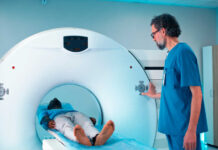
If you keep suffering diarrhea, abdominal and constant vomiting, it is possible a tick might be responsible.
How Does a Tick Bite Trigger Meat Allergies?
When you get bitten by the lone star tick, it transmits something called “alpha-gal.” This is a sugar present in all mammals except humans.
According to Dr. Sarah McGill, associate professor of gastroenterology and hepatology at the University of North Carolina School of Medicine, this transmission can result in alpha-gal syndrome. This is a tick-borne meat allergy. If you are infected, you might experience gastrointestinal symptoms for several hours. This usually happens after eating meat or certain milk products.
In a university news release, Dr. McGill said patients must suspect alpha-gal syndrome if they have abdominal pain, nausea, and diarrhea. The lone star tick is in North Carolina, the Midwest, and the southern United States. Sometimes, it takes up to months after the tick bite to begin feeling sick after eating meat.
Dr. McGill said diagnosing patients with the alpha-gal syndrome was initially hard because it was not in the vocabulary. She also said they would come in diarrhea, frequent abdominal pain, and symptoms of irritable bowel syndrome.
According to a study on patients with these symptoms, about 75% recall a tick bite. However, ticks can be tiny in the larval stage, so a bite would go unnoticed. McGill recommends symptomatic patients should undergo a blood test known as alpha-gal IgE. If the results are positive, they should begin an alpha-gal elimination diet. She said this would resolve or greatly improve the symptoms.
As part of the diet, patients with the alpha-gal syndrome should not eat or drink meat and milk products such as butter. However, the symptoms might vary, and Dr. McGill said most people do fine with dairy. However, she also said she had treated patients who have reacted to small amounts of mammalian by-products in processed food. McGill said the difference in tolerance would depend on your gut microbes.
How to Deal with the Tick Bite
The lone star tick is majorly active between April and September. If you have been previously bitten and have the alpha-gal should avoid additional tick bites. This is because another bite could worsen their allergy.
If you have symptoms like rashes, swelling, or problems breathing, you need to see an allergist. Dr. McGill said the reactions might decrease with time but repeat alpha-gal IgE testing could help determine a future treatment plan.
Conclusion
The Alpha-gal syndrome can lead to discomfort and health complications. See your doctor for a proper diagnosis if you keep having these symptoms.


















